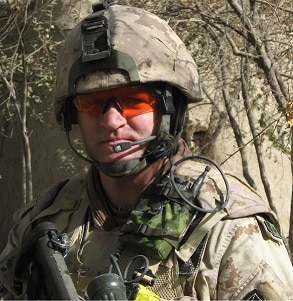The military is known for producing good leaders. This series features leadership wisdom from former Canadian military leaders now in private enterprise. In each article, a military Leadership Trait will be described by a former military leader, and then applied to business. In the Commentary section, we will discuss how to develop the trait, or how to identify that trait in an interview.
Leadership Trait – Planning
I learned many important things in my 32 year military career, but planning and flexibility were the most important. Let me address planning in this short article.
 Fundamentally, every human endeavour needs to be planned; we all plan in one way or another, but the discipline of the military planning process, and the significant investment of training and education that supports it from the tactical to the strategic level, provides a framework to deal with every military and business-problem. The most important outcome however, is found in General and later US President Eisenhower’s quotation, “Plans Are Nothing; Planning is Everything”. Plans may be written, like annual business plans, but disciplined planning provides the organization the information and tools to adapt to changing situations.
Fundamentally, every human endeavour needs to be planned; we all plan in one way or another, but the discipline of the military planning process, and the significant investment of training and education that supports it from the tactical to the strategic level, provides a framework to deal with every military and business-problem. The most important outcome however, is found in General and later US President Eisenhower’s quotation, “Plans Are Nothing; Planning is Everything”. Plans may be written, like annual business plans, but disciplined planning provides the organization the information and tools to adapt to changing situations.
One of my first jobs in the Army as a young Lieutenant in the Infantry was as the Battalion Intelligence Officer on peacekeeping operations overseas. The intelligence gathering plan directed the units’ patrols -small teams of 4-8 soldiers – that would move through operational areas where they would interact with belligerents, civilians and other actors. The intelligence plan would then be adjusted as information was collated to adapt to a changing situation. Business intelligence functions in a similar manner, though some of the terminology may be different.
One of my last jobs in the military as a Colonel was as the Deputy Task Force Commander for a multinational staff that delivered major long term capital projects to build capacity in Palestinian security services in the West Bank, a US State Department sponsored effort that also supported Israeli security. The planning factors were complex-long term capital infrastructure and logistics hub resource investment decisions, for example–but at its core, the process was the same as the one I used as a Lieutenant.
The most important step in all plans is to define the problem and the desired outcome. Without clearly identifying the problem you are trying to solve and what you are trying to achieve, you can come up with excellent solutions to the wrong problems, wasting precious time, energy and resources. To quote Stephen Covey, “Begin with the End in Mind”.
To return to my intelligence planning, things were not initially flawless. My initial effort did not focus the teams on a specific enough aim and that meant that my small analysis team became overwhelmed with information. I realized this and re-framed the problem sharply. Live and learn. This is why in planning, the military stresses something called “Mission Analysis”, a formal way to ensure that you have “defined the problem” correctly. Over time, the situation changed, and I had to once again adjust the plan.
In my current role at the 2015 Pan Am Games, everything I have learned about planning is being applied.
The “problem” is not moving large groups of soldiers safely and securely over a complex operational environment to many different locations from Kandahar to Croatia to Haiti, housing them, feeding them and moving them within strict timelines in order to perform challenging battle tasks; the “problem” is moving large groups of athletes safely and securely over a complex transportation network from St. Catharines to Caledon to Toronto, housing them, feeding them and moving them within strict timelines in order to perform challenging athletic tasks!
Martin Kenneally, Senior Director of Security and Accreditation for the TO2015 Organizing Committee for the Pan Am Para Pan Games.
Commentary
Martin’s article highlights the need for planning in military and business organizations. Although the planning function is often relegated to a staff role, the skill of planning is a critical one for all aspiring executives.
When interviewing future leaders for your organization, you will find that most competent business executives will be able to articulate their successes and achievements comfortably. Focus your “drill-down” questions on the processes candidates took to achieve those results. Formal planning, and especially contingency planning is becoming increasingly important as corporations are being forced to adapt rapidly to the changing macro-environmental factors in the marketplace. “Risk comes from not knowing what you are doing!”
Biography:
Martin Kenneally is the Senior Director of Security and Accreditation for the TO2015 Organizing Committee for the Pan Am Para Pan Games to be held in and around Toronto in July and August 2015, the largest multi-sport event in Canadian history with nearly sixty venues spread across the Greater Golden Horseshoe area. 11,000 participants; 20,000 volunteers and staff; and thousands of security personnel will participate in this event. Martin served for 32 years in the Canadian Forces, completing US Army Ranger School, six overseas tours including Afghanistan, South Korea, Haiti and others, commanded Third Battalion of the Princess Patricia’s Canadian Light Infantry in Edmonton, Alberta, and finished his career as a Colonel in Israel deployed with a small international military and civilian staff delivering a $500m US State Department project to bolster Palestinian and Israeli security in 2012.
